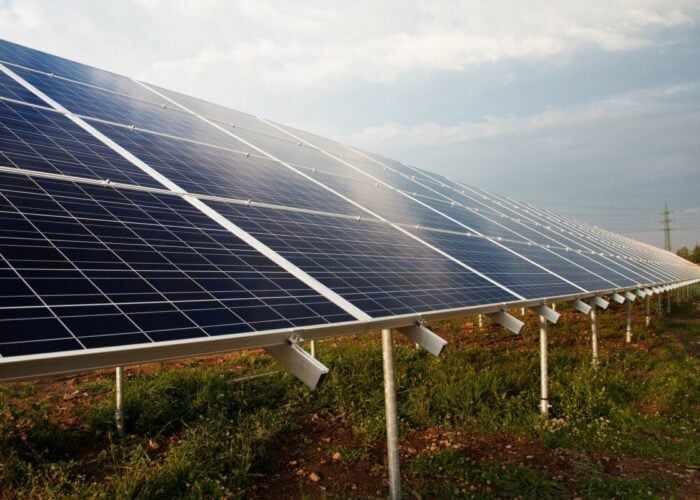Major merchant solar cell producer Neo Solar Power (NSP) may be taking a cautious ‘wait-and-see’ approach to moving production outside Taiwan to circumvent US anti-dumping duties but its plan to launch a yieldco on the Hong Kong stock exchange reveals a more aggressive option to rekindle its business growth.
A recent visit by PV Tech to NSP’s headquarters in Hsinshu, Taiwan, was intended to understand and gain insight into the company’s strategy to rejuvenate sales, which had sunk significantly since June 2014 following the US anti-dumping case.
Try Premium for just $1
- Full premium access for the first month at only $1
- Converts to an annual rate after 30 days unless cancelled
- Cancel anytime during the trial period
Premium Benefits
- Expert industry analysis and interviews
- Digital access to PV Tech Power journal
- Exclusive event discounts
Or get the full Premium subscription right away
Or continue reading this article for free
The backdrop had been comments from a number of Taiwanese and Chinese PV manufacturers including NSP, indicating that overseas production plants were being considered.
Rivals, such as solar cell producer Gintech Energy, had only just announced plans to build a 350MW cell production facility in Thailand ahead of PV Tech's Taiwan trip.
However, Simon Li, VP of business & worldwide sales and marketing at NSP, quickly dispelled any suggestion of the company following Gintech’s strategy in the near future.
“The potential risks and cost are huge,” said Li. “We have looked at many places such as India, Malaysia and Thailand but the key was to evaluate where we could produce overseas that was overall lower cost. At this time we do not make a decision, perhaps at the end of the year will be clearer.”
Surprisingly at the time, Li said that the company had a target of becoming a US$1 billion company within the first 10 years of its creation, referencing the fact that the world’s largest semiconductor foundry, Taiwan-based TSMC, did not achieve that milestone within that timeframe.
NSP was officially incorporated in August, 2005 and started commercial operations in December 2006. The company has been listed on the TWSE since January 2009. NSP had revenue of around US$898.45 million in 2014.
With a wait-and-see approach to locating production overseas to revive its solar cell business and a growth target that therefore seemed impossible to reach, the implication it was relying on just organic growth did not resonate well.
However, just after PV Tech’s Taiwan trip, NSP announced that its EPC and project development subsidiary, General Energy Solutions (GES), would launch a yieldco IPO on the Hong Kong stock exchange.
NSP is directly investing US$50 million to establish the yieldco, which is expected to float either at the end of 2015 or sometime in the first quarter of 2016, according to the company.
In a similar vein to other PV manufacturers with yieldco plans, NSP noted that expanding its downstream activities through capital raised in the yieldco would also support its upstream solar cell and module business, providing increased internal demand and the growth demand to match the revenue target previously highlighted by Li.
The previous picture of NSP has therefore changed and understandably; Li did not speak of the GES plans, only touching on the fact that GES was a subsidiary of the company.
The downstream growth plans also made sense of NSP’s plans to add module capacity at Del Solar, with which NSP merged in late 2012.
NSP ran at 100% utilisation rates in 2014 and increased module capacity from 240MW to 480MW by the end of 2014.
“Our module plants were fully loaded in the first quarter of this year due to demand,” noted Li. “Both Japan and Europe are driving that demand but we are also the biggest supplier of modules to the Taiwan market, which although small is still growing.”
The company also has plans expand solar cell capacity to 3GW by the end of 2015, up from 2.2GW in 2014.
Whether the solar cell capacity expansion would be undertaken is unclear, especially given the lower utilisation rates in the first half of the year. However Li said that a 250MW expansion was undertaken in the first quarter of 2015 and a further 250MW expansion was under consideration.
“We did expand solar cell capacity last year, primarily through productivity and cell efficiency gains,” said Li.
The average conversion efficiency of NSP’s multicrystalline solar cells was 17.2%, 17.4% and 17.5% in 2012 and 2013 and 2014.
NSP places a lot of emphasis on its R&D activities and solar cell quality and high-efficiencies.
“We have a large R&D department, probably bigger than other companies [in Taiwan], said Li.
Li noted that the company typically spent 3 to 5% of annual revenue on R&D activities and had 100 staff in the R&D department.
One of the recent developments had been the development of an n-type bifacial solar cell dubbed ‘BiFi’ with an equivalent conversion efficiency of 24.5%. Li noted that a key market for this product would be car ports and a number of other niche markets.
With the company target of US$1 billion in sales to be met in 2016, capacity expansions and launch of NSP's yieldco remain critical metrics to watch and provide an alternative strategy to combat the US anti-dumping duties, without establishing manufacturing overseas.






